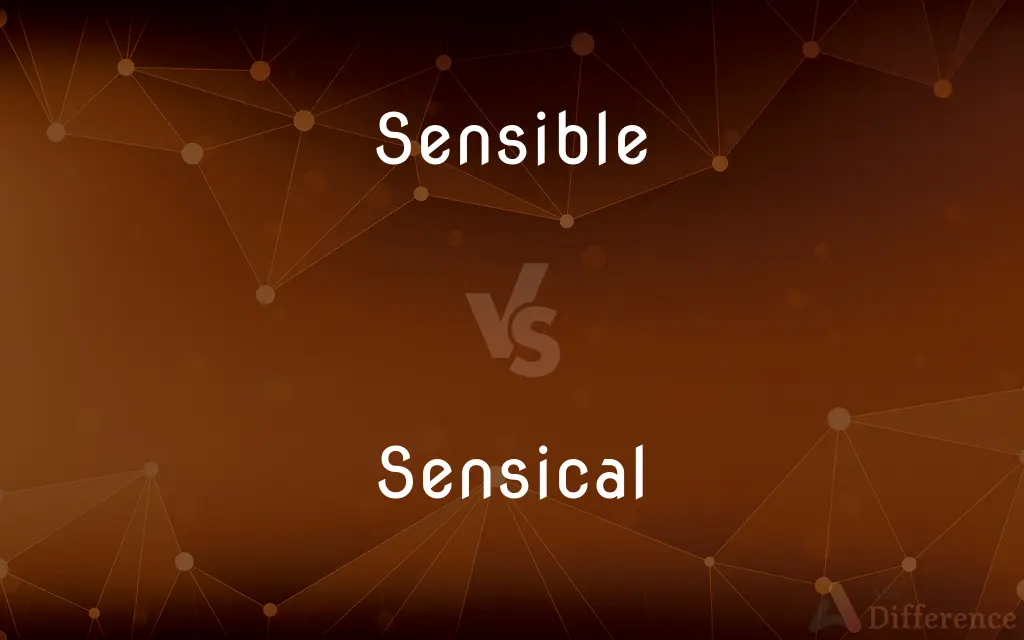Sensible vs. Sensical — What's the Difference?
Edited by Tayyaba Rehman — By Fiza Rafique — Updated on March 4, 2024
Sensible refers to practicality and reasonableness, while sensical, though less commonly used, pertains to making sense logically.

Difference Between Sensible and Sensical
Table of Contents
ADVERTISEMENT
Key Differences
Sensible is a term widely recognized and used to describe actions, decisions, or individuals that exhibit good judgment, practicality, and reasonableness. It implies a level of wisdom and consideration for consequences in making choices. For instance, wearing a coat on a cold day is considered sensible because it's a practical decision for comfort and health. Sensical, on the other hand, is not as commonly used but relates specifically to something that makes sense logically or is understandable. It focuses more on the coherence and logical structure of thoughts, statements, or ideas rather than their practical implications. A statement being sensical means it is constructed in a way that is logical and can be understood, regardless of its practical application.
Sensible is more frequently encountered and is applied in a broader range of contexts, including decisions that affect personal well-being, financial choices, and social interactions. It carries a connotation of practical wisdom and the ability to make choices that are beneficial in the long run.
Sensical is often used in discussions about language, logic, and philosophy to describe ideas, arguments, or statements that are coherent and logical. While its usage is more niche, it serves an important role in distinguishing between what is merely understandable and what is also practically wise.
The distinction between sensible and sensical can be nuanced, with sensible encompassing a wider array of attributes including practicality, reasonableness, and appropriateness to the circumstances. Sensical, by focusing on logical coherence, does not necessarily imply practicality or advisability in the real world.
Both terms contribute to evaluating information, ideas, and decisions. Sensible often adds an additional layer of judgment regarding the practicality and wisdom of actions, whereas sensical evaluates the logical structure and coherence of thoughts or statements.
ADVERTISEMENT
Comparison Chart
Definition
Exhibiting good judgment, practicality, and reasonableness.
Making sense logically or being understandable.
Common Usage
Widely used to describe practical decisions and actions.
Less common, used to describe logical coherence.
Contexts
Personal decisions, financial choices, social interactions.
Language, logic, philosophy discussions.
Implication
Implies wisdom, practicality, and consideration for consequences.
Focuses on coherence and logical structure.
Connotation
Practical wisdom and beneficial choices.
Understandability without necessarily implying practical wisdom.
Compare with Definitions
Sensible
Characterized by or exhibiting reasonableness and sound judgment.
She gave me some sensible advice on career choices.
Sensical
Coherent and understandable, even if not practical.
The theory is sensical within its own parameters.
Sensible
Pertaining to the senses as a means of providing pleasure or satisfaction.
The design of the garden provided a sensible delight with its variety of textures and fragrances.
Sensical
Used to describe logical consistency in narratives or explanations.
The plot of the book is sensical, with no major plot holes.
Sensible
Reflecting awareness of social norms and expectations.
His response was sensible and respected the group's dynamics.
Sensical
Making sense or being logical in structure.
Her explanation was sensical, even if it was complex.
Sensible
Showing good judgment and practical understanding.
It was a sensible decision to save money for emergencies.
Sensical
Sometimes used in contrast to nonsensical, to affirm logical coherence.
Compared to earlier theories, his hypothesis is quite sensical.
Sensible
Suitable for a particular purpose; practical.
Wearing layers in cold weather is a sensible strategy.
Sensical
Pertaining to ideas or statements that follow a logical sequence.
His argument was sensical but lacked real-world applicability.
Sensible
Acting with or exhibiting good judgment; reasonable
A sensible person.
A sensible choice.
Sensical
(rare) That makes sense; showing internal logic; rational, sensible.
Sensible
Not ornate or impractical
A sensible hairdo.
Sensible shoes.
Sensible
Having a perception of something; cognizant
"I am sensible that a good deal more is still to be done" (Edmund Burke).
Sensible
Perceptible or appreciable by the senses or by the mind
A sensible difference in temperature.
Sensible
Acting with or showing thought and good sense;
A sensible young man
Sensible
Aware intuitively or intellectually of something sensed;
Made sensible of his mistakes
I am sensible that the mention of such a circumstance may appear trifling
Sensible that a good deal more is still to be done
Sensible
Proceeding from good sense or judgment;
A sensible choice
Common Curiosities
How do I know if a decision is sensible?
A decision is sensible if it shows good judgment, is practical, and considers the consequences. It often aligns with common sense and wisdom.
Is "sensical" a real word?
While less common, "sensical" is a legitimate word used to describe something that makes logical sense. However, it is not as widely used as "sensible."
Can a sensical argument be impractical?
Yes, an argument can be logically coherent (sensical) but impractical if it doesn't consider real-world constraints or lacks practical applicability.
Can something be sensible but not sensical?
Yes, a decision can be practical and wise (sensible) without necessarily being based on a logical structure (sensical), especially if it's based on intuition or experience rather than formal logic.
Are there educational approaches to enhance one's ability to think in a manner that is both sensible and sensical?
Educational approaches that focus on critical thinking, logical reasoning, and practical problem-solving can enhance one’s ability to think in ways that are both sensible and sensical. Exposure to a variety of real-world scenarios and logical puzzles can also help.
How can I improve my ability to make sensible decisions?
Improving practical judgment involves gaining experience, learning from mistakes, seeking advice from knowledgeable individuals, and considering long-term consequences.
Does culture influence what is considered sensible?
Yes, cultural norms and values significantly influence what is considered sensible. Practices or decisions viewed as sensible in one culture may not be regarded as such in another, reflecting differing priorities and contexts.
In scientific research, is it more important for hypotheses to be sensible or sensical?
In scientific research, hypotheses must be sensical, meaning they should be logically coherent and based on sound reasoning. Being sensible, while valuable, is secondary to the logical foundation, especially in the early stages of hypothesis formulation.
Can literature or art be considered sensible or sensical?
Literature and art can be considered sensical when they present ideas or narratives that are coherent and logically structured. They can be deemed sensible when they reflect sound judgment or convey practical insights into human experiences.
Why is it important to distinguish between sensible and sensical?
Distinguishing between the two helps in evaluating whether an idea or decision is not only logically coherent but also practical and advisable in real-life situations.
How does emotional intelligence relate to making sensible decisions?
Emotional intelligence plays a crucial role in making sensible decisions, as it involves the ability to understand and manage emotions, both one's own and those of others. High emotional intelligence can lead to decisions that are considerate, empathetic, and socially appropriate, aligning with the definition of sensible.
Share Your Discovery

Previous Comparison
Lingonberry vs. Cranberry
Next Comparison
Larvae vs. LarvaAuthor Spotlight
Written by
Fiza RafiqueFiza Rafique is a skilled content writer at AskDifference.com, where she meticulously refines and enhances written pieces. Drawing from her vast editorial expertise, Fiza ensures clarity, accuracy, and precision in every article. Passionate about language, she continually seeks to elevate the quality of content for readers worldwide.
Edited by
Tayyaba RehmanTayyaba Rehman is a distinguished writer, currently serving as a primary contributor to askdifference.com. As a researcher in semantics and etymology, Tayyaba's passion for the complexity of languages and their distinctions has found a perfect home on the platform. Tayyaba delves into the intricacies of language, distinguishing between commonly confused words and phrases, thereby providing clarity for readers worldwide.
















































